Stephen Hawking Funeral held today at Cambridge church
Daily Mail
Fri March 30, 2018
Area: Cambridgeshire
Crowds lined the streets to pay their final respects to the much admired scientist and a spontaneous round of applause broke out as six porters from the physicist's former college carried his coffin from the hearse into the church.
Actor Eddie Redmayne, who played Hawking in the Hollywood biopic of his life, will give a reading at Prof Hawking's funeral, with Ecclesiastes 3.1-11 as the chosen text. This will be followed by a reading by the Astronomer Royal, Martin Rees.
Eulogies will be delivered by Robert Hawking, Prof Hawking's eldest child, and Professor Fay Dowker, a former student of Prof Hawking.
His ashes will be interred next to the grave of Sir Isaac Newton at Westminster Abbey and near Charles Darwin's.
Stephen Hawking's children, Lucy, Robert and Tim, said in a statement: 'Our father lived and worked in Cambridge for over 50 years.
'He was an integral and highly recognisable part of the university and the city.
'For this reason, we have decided to hold his funeral in the city that he loved so much and which loved him. Our father's life and work meant many things to many people, both religious and non-religious. So, the service will be both inclusive and traditional, reflecting the breadth and diversity of his life.'
The Dean of Westminster, the Very Reverend Dr John Hall, said: 'It is entirely fitting that the remains of Professor Stephen Hawking are to be buried in the Abbey, near those of distinguished fellow scientists.
Sir Isaac Newton was buried in the Abbey in 1727. Charles Darwin was buried beside Isaac Newton in 1882.
'Other famous scientists are buried or memorialised nearby, the most recent burials being those of atomic physicists Ernest Rutherford in 1937 and Joseph John Thomson in 1940.
'We believe it to be vital that science and religion work together to seek to answer the great questions of the mystery of life and of the universe.'
Prof Hawking died on March 14, at the age of 76, after a lifetime as one of the world's most renowned scientists despite his battle with motor neurone disease, prompting an outpouring of grief from around the world.
The best-known theoretical physicist of his time, Hawking wrote so lucidly of the mysteries of space, time and black holes that his book, 'A Brief History of Time,' became an international best-seller, making him one of science's biggest celebrities since Albert Einstein.
'He was a great scientist and an extraordinary man whose work and legacy will live on for many years,' his children Lucy, Robert and Tim said in a statement. His courage and persistence with his brilliance and humour inspired people across the world. He once said, 'It would not be much of a universe if it wasn't home to the people you love.' We will miss him forever.'
Even though his body was attacked by amyotrophic lateral sclerosis, or ALS, when Hawking was 21, he stunned doctors by living with the normally fatal illness for more than 50 years. A severe attack of pneumonia in 1985 left him breathing through a tube, forcing him to communicate through an electronic voice synthesizer that gave him his distinctive robotic monotone.
But he continued his scientific work, appeared on television and married for a second time.
As one of Isaac Newton's successors as Lucasian Professor of Mathematics at Cambridge University, Hawking was involved in the search for the great goal of physics - a 'unified theory.'
Such a theory would resolve the contradictions between Einstein's theory of relativity, which describes the laws of gravity that govern the motion of large objects like planets, and the quantum mechanics theory, which deals with the world of subatomic particles.
For Hawking, the search was almost a religious quest - he said finding a 'theory of everything' would allow mankind to 'know the mind of God.'
'A complete, consistent unified theory is only the first step: our goal is a complete understanding of the events around us, and of our own existence,' he wrote in 'A Brief History of Time.'
In later years, though, he suggested a unified theory might not exist.
He followed up 'A Brief History of Time' in 2001 with the more accessible sequel 'The Universe in a Nutshell,' updating readers on concepts like super gravity, naked singularities and the possibility of an 11-dimensional universe.
Hawking said belief in a God who intervenes in the universe 'to make sure the good guys win or get rewarded in the next life' was wishful thinking.
'But one can't help asking the question: Why does the universe exist?' he said in 1991. 'I don't know an operational way to give the question or the answer, if there is one, a meaning. But it bothers me.'
The combination of his best-selling book and his almost total disability - for a while he could use a few fingers, later he could only tighten the muscles on his face - made him one of science's most recognizable faces.
He made cameo television appearances in 'The Big Bang Theory,' ''The Simpsons' and 'Star Trek: The Next Generation' and counted among his fans U2 guitarist The Edge, who attended a January 2002 celebration of Hawking's 60th birthday.
His early life was chronicled in the 2014 film 'The Theory of Everything,' with Eddie Redmayne winning the best actor Academy Award for his portrayal of the scientist. The film focused still more attention on Hawking's remarkable achievements.
Some colleagues credited that celebrity with generating new enthusiasm for science.
His achievements and his longevity helped prove to many that even the most severe disabilities need not stop patients from living.
Hawking was born Jan. 8, 1942, in Oxford, and grew up in London and St. Albans, northwest of the capital. In 1959, he entered Oxford University and then went on to graduate work at Cambridge.




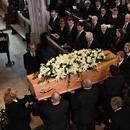
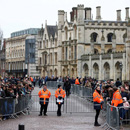
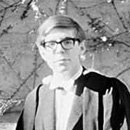
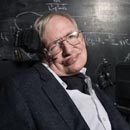
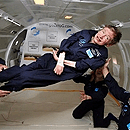
 Share your thoughts in the Forum
Share your thoughts in the Forum